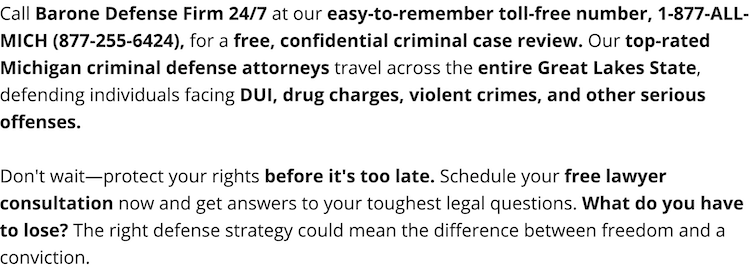Federal Investment Schemes
Investment schemes have become increasingly common in today's global economy. The typical investment scam is often characterized as an offer of a low- or no-risk investment with guaranteed high and consistent returns. The most common types of Michigan federal investment schemes are investment or securities fraud, Ponzi schemes, and pyramid schemes.
The U.S. Securities and Exchange Commission (SEC) and the Federal Bureau of Investigations (FBI), together with state financial agencies such as the Michigan Department of Licensing and Regulatory Affairs (LARA), are charged with investigating possible investment schemes and prosecuting them under various state and federal criminal laws. A person accused of partaking in Michigan federal investment schemes should consult with a dedicated federal financial attorney for more information.
Federal Laws Dealing with Investment Schemes
The United States has enacted a handful of laws that regulate the investment and securities industry. If someone attempts to defraud another individual or entity by any scheme or artifice or obtain money in a fraudulent manner that relates to commodities or securities, the person can be charged with the general federal offense of securities and commodities fraud under a number of different federal laws, including:
- The Securities Act of 1933
- The Securities Exchange Act of 1934
- The Trust Indenture Act of 1939
- The Investment Company Act of 1940
- The Investment Advisers Act of 1940
While it depends on the exact crime, the most common anti-fraud provision in the Securities Exchange Act of 1934 sets a statute of limitations of two years after the fraud has been discovered, or five years after the fraud has occurred.
Common Schemes in Michigan
There are several different types of crimes that fall under the umbrella category of Michigan federal investment schemes. One type is microcap fraud. Microcap stocks or penny stocks are stocks in small companies—those with less than $300 million in market capitalization—that are not subject to the reporting and disclosure rules that are required of larger companies who trade on the New York Stock Exchange or NASDAQ. Microcap fraud may involve misrepresenting the size of a company and its stock value to induce an investor to make a large purchase up front.
The business model of a pyramid scheme involves recruiting members by promising them payments for recruiting more members. Members must pay to join the organization and are promised a commission based on new people they enroll. This quickly becomes unsustainable and members are unable to make a profit.
Finally, a type of pyramid scheme, a Ponzi scheme is where money from newer investors are used to provide returns to the original investors. Because the original investors are actually being paid high returns, newer investors believe it is a legitimate investment. Eventually, the money owed to the older investors becomes greater than the money being raised from new ones and the Ponzi scheme collapses.
An Attorney Can Explain Michigan Federal Investment Schemes
Michigan federal investment schemes are generally carried out through one or more schemes that induce individuals or entities to put forth money or something else of value with a promise that they will be rewarded with enormous returns. These types of scams can be hard to detect at first and can last for years before anyone catches on.
If you have been charged with or are being investigated for Michigan federal investment schemes, it is important to act quickly to protect your rights. An aggressive attorney can investigate the facts of a case to create a robust defense to combat these charges.
 Barone Defense Firm Home
Barone Defense Firm Home




















